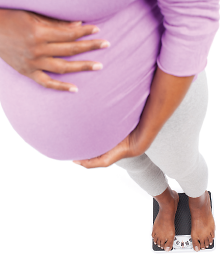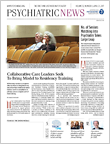While previous research has shown prenatal exposure to famine is associated with a twofold increased risk of nonaffective psychosis in offspring, less is known whether low weight gain during pregnancy alone increases this risk.
A study published February 22 in JAMA Psychiatry suggests extremely low weight gain during pregnancy (weight gain of less than 18 pounds) may increase the risk of psychosis in offspring, even in a well-nourished population.
The study “contributes to an increasingly robust body of convergent evidence for a role of prenatal nutritional deficiency in the early origins of psychosis and strengthens the argument for examining prenatal nutritional supplements and dietary patterns as a means of prevention,” Ezra Sesser, M.D., Dr.P.H., and Katherine Keyes, Ph.D., of the Psychiatric Epidemiology Training Program at Columbia University Mailman School of Public Health wrote in an accompanying commentary published in JAMA Psychiatry.
Gestational weight gain ranging from 25 pounds to 35 pounds in women with normal BMI (ranging from 18.5 to 24.9) is considered healthy, according to guidelines by the American College of Obstetricians and Gynecologists.
For the study, Renee Gardner, Ph.D., of the Karolinska Institutet in Stockholm and colleagues analyzed data from Swedish health and population registries, focusing on 526,042 individuals who were born in Sweden from 1982 through 1989 and their mothers. The offspring were tracked from age 13 to the end of 2011 (age 22 to 29). Gestational weight gain of the mother was calculated as the difference in maternal weight between the first prenatal visit (baseline) and delivery.
At the end of the study period, 2,910 offspring had an ICD-9 or ICD-10 diagnosis of nonaffective psychosis, which included 704 with narrowly defined schizophrenia.
Among the individuals with psychosis, 184 (6.32 percent) had mothers with extremely inadequate gestational weight gain (less than 17.6 pounds for mothers with normal BMI). In comparison, the mothers of 23,627 (4.52 percent) individuals without psychosis had extremely low weight gain during pregnancy.
Mild maternal thinness (defined as BMI ranging from 17.0 to 18.5) and class 2 obesity (BMI ranging from 35 to 40.0) at baseline were also found to be associated with a modest risk of nonaffective psychosis in offspring (hazard ratio=1.21 and 2.15, respectively). Outcomes were similar in analyses that adjusted for confounding factors such as socioeconomic status.
While Gardner and colleagues suggested that malnutrition is a potential mediating factor for inadequate gestational weight, they pointed out that other factors may also be involved. “Severely inadequate gestational weight gain may ... be indicative of an existing maternal medical condition, such as endrocrinologic disorders, malabsorption, anorexia nervosa, bulimia nervosa, or hyperemesis gravidarum,” they wrote. “Insufficient weight gain can also occur in otherwise healthy individuals owing to insufficient medical guidance or by a drive to conform to societal (but not medical) standards of appropriate weight gain.”
The researchers emphasized that more research is needed to understand the association between conditions that lead to insufficient maternal weight gain and the risk for nonaffective psychosis in offspring.
The study was funded by the Swedish Research Council. ■
An abstract of “Association of Gestational Weight Gain and Maternal Body Mass Index in Early Pregnancy With Risk for Nonaffective Psychosis in Offspring” can be accessed
here.

